Dr. Damla Karsan lives in fear for her patients—and for all pregnant Texans.
The Houston OB-GYN has spent the last four years painfully navigating the state’s draconian abortion bans, oftentimes for patients who face severe complications. With vaguely defined exceptions for medical emergencies, the law has forced doctors to either delay or deny life-saving care out of worry they could face lawsuits or prison time for performing pregnancy termination.
Karsan knows the risks well: When she promised to perform abortion care in 2023 for Kate Cox, a Dallas mother who saw her health steadily deteriorate after doctors failed to terminate her fatal pregnancy, she was met with direct threats of prosecution from Attorney General Ken Paxton. Cox eventually fled the state. Paxton’s attacks on reproductive healthcare workers have only escalated since then, most recently with the arrest of a Houston-area midwife for allegedly giving abortion pills to a patient—the first criminal charges under the state’s ban that took effect after the 2022 fall of Roe v. Wade.
Karsan has had other patients who were hemorrhaging during a miscarriage—just a few steps away from death—and still faced delayed care at the ER. Some of her patients are too scared to even get pregnant, while others have fled Texas in order to start their families safely. Her experiences mirror the flood of traumatic stories from other Texans and providers.
“These laws are torturing women, there’s no other way to put it,” Karsan told the Texas Observer in between deliveries from her practice just south of the Houston Medical Center. “It is absolutely horrible having to try to help patients get care when the state has barred us from using our best medical judgment.”

A 2021 near-total abortion ban, known as Senate Bill 8, encourages private civil suits against anyone who “aids or abets” care, and the 2022 post-Roe criminal ban threatens doctors who perform abortion with $100,000 in fines, loss of their medical license, and up to 99 years in prison. The criminal law holds an exception for patients who are at “risk of death” or “substantial impairment of a major bodily function.” For years, doctors and advocates have said the carve-out is ambiguous and unworkable in reality, resulting in confusion and trepidation when treating high-risk patients.
Following a long—and largely unsuccessful—road to clarify the laws, including a 2023 lawsuit filed by 20 women denied abortion care despite pregnancy complications and a flurry of proposals from Democrats last legislative session, a new bill filed by Texas Senate Republican Bryan Hughes now seeks to add clarity.
Introduced just before the Legislature’s bill filing deadline, Senate Bill 31—now scheduled for a committee hearing Thursday—would strike the term “life-threatening condition” from the criminal law, as the language has caused confusion among doctors. It includes guidance from a previous Texas Supreme Court ruling that found the law does not require a medical emergency to necessarily be imminent or irreversible before a doctor can take action. It would also clarify that physicians are not required to “delay or withhold” life-saving medical care in order to preserve the life of the fetus, and it would ostensibly offer stronger protections for doctors when treating ectopic pregnancy and premature water breaks.
Dubbed the “Life of the Mother Act,” the bill also clarifies that a doctor or lawyer can discuss a medically necessary abortion with a patient without the risk of “aiding and abetting” charges. Representative Charlie Geren, a Fort Worth Republican, has filed an identical companion bill in the House.
The legislative proposals mark the most significant effort by Republicans to allay concerns from patients and providers about Texas abortion law thus far.
Hughes’ office did not return calls for comment; however, he recently told local newspapers in Texas that the law is meant to “remove any excuse” for doctors not to treat pregnant patients whose lives are in jeopardy. “I’ve said for some time that the law is clear, but if we can make it clearer, if we can remove any doubt and hesitation we want to do that,” Hughes told the Houston Chronicle. At a Capitol press conference this month, Geren said he considers the legislation “the most important bill” he’s carried in his more than two decades at the Legislature. “Too many women have suffered. Too many have died. If one has died, it’s too many,” said Geren. “I have friends whose wives can no longer conceive because of the problems they went through with their first pregnancy and the delay their doctors faced in addressing the problems.”
In January, the staunchly anti-abortion Lieutenant Governor Dan Patrick called on the Legislature to clarify language in the law so that doctors are “not in fear of being penalized if they think the life of the mother is at risk,” becoming the first statewide official to do so this session. And he included the bill on his list of top 40 legislative priorities. Meanwhile, Republican Governor Greg Abbott—who holds veto power over bills—has said the law doesn’t need to be changed but that he may be accepting of the GOP-backed legislation. Geren has pleaded with Abbott to “Veto everything else, but [leave this bill] alone.”
It remains to be seen if either proposal will win the approval of enough fellow Republicans to pass, or if the GOP will get sidetracked by a slew of bills aimed at further restricting the flow of abortion pills—the most aggressive of which is backed by Hughes himself. The sweeping 43-page Senate Bill 2880 would allow Texans to file civil suit against groups that mail abortion-inducing drugs into Texas; make it a felony to pay for a person’s abortion care, including travel costs; and empower the “biological father of the unborn child” to file “wrongful death” lawsuits against abortion patients, among other extreme provisions.
Democrats like Representative Donna Howard, an Austin Democrat, have spent years championing wider exceptions to the state’s abortion laws, including filing a broader bill to do so this session as well as a measure to allow abortion care for survivors of sexual assault. Howard is supportive of Hughes and Geren’s bill and will urge her Democratic colleagues to support it, saying it “would save the lives of Texas moms.” She considers the new Republican-backed measure a reflection of the dissatisfaction among GOP constituents.
“Many of the communities my Republican colleagues represent aren’t happy. They feel like the law went too far,” she told the Observer. “They are pressuring for a change so they can safely grow their families. And I think [the new GOP] bill is a direct response to that. … To let the law stand as-is would be the total opposite of what Republicans supposedly say they want: Women will continue to lose their pregnancies, lose their babies, and even lose their lives.”
After a string of horrifying near-death experiences under the laws, an investigation last fall from ProPublica found that three pregnant women in Texas—Josseli Barnica, 28, Nevaeh Crain, 18, and Porsha Ngumezi, 35—died after doctors waited to treat their miscarriages. Medical experts interviewed concluded that their deaths were preventable. The news spurred Karsan and 110 other OB-GYNs to sign on to a letter in November urging lawmakers to reform Texas abortion law, writing: “Anti-abortion groups and others are saying the blame does not fall on Texas law. That is simply not true. As OB-GYNs in Texas we know firsthand how much these laws restrict our ability to provide our patients with quality, evidence-based care. Texas needs a change in laws.”
Karsan points out that the groundswell of opposition is significant for Texas doctors, who have been hesitant to express their frustration publicly out of fear of retaliation. Self-employed in private practice and unbound by the systems that rely on state coffers, Karsan said she is more able to speak her mind and has even helped challenge the laws in court.
“A lot of my colleagues have been muzzled by the healthcare institutions they are employed by. They do not want to upset the powers that be because these institutions get some of their funding from the state.”
Until now, efforts to help clarify the law have been minimal. After years of staying noticeably silent on the issue, the Texas Medical Board—prompted by a petition from healthcare lobbyists—adopted guidance last June on how doctors should interpret the abortion bans. However, those like Karsan say the guidelines didn’t help give physicians like her any “meaningful leeway.” Additionally, the board failed to provide a comprehensive list of cases in which abortion care would be legal, and TMB Board Chair Dr. Sherif Zaafran himself acknowledged the guidance is limited and could not prevent criminal prosecution. (All TMB members are appointed by Abbott, and many have donated generously to his campaign.)
While the 2023 legislative session saw a successful bipartisan effort to cover two specific conditions under the law, ectopic pregnancies and premature water breaks, the measure still left many other potentially life-threatening conditions in gray areas.
Until Patrick’s recent call, Texas Republicans have largely reiterated—in the media as well as in the courtroom—that the law is clear as-is and the onus rests with individual physicians. In fact, in a November op-ed for the Houston Chronicle, Hughes himself not only wrote that the law is “plenty clear” but ascribed blame for doctors’ fear to articles like the ones “published in ProPublica,” writing that, “Pro-abortion groups and their allies in the left-wing media have been relentless in their attempts to scare doctors.”
Elisabeth Smith, director of state policy at the Center for Reproductive Rights, said Texas is “sadly not alone” in its slow efforts to widen medical exceptions, as the 11 other states that enforce criminal abortion bans have largely not done so. (Recently, lawmakers in Kentucky added exceptions to their state’s near-total abortion ban; however, pro-abortion groups have criticized the additions as insignificant.)
“Up until now, the state of Texas—like most other banned states—has made it very clear they are not interested in providing clarity for providers and patients,” said Smith. “And Texas doctors face some of the most draconian penalties in the country. They feel like hospital lawyers are sitting on their shoulders, and [are] afraid of making the wrong choice.”
Reproductive health advocates like Smith note that the only real solution to preventing deaths and physical trauma as a result of abortion bans is to strike the law altogether. “More clarity is a good thing,” she said. “But the problem with any abortion ban is that they are trying to squeeze medical decision-making into narrow exceptions that cannot possibly cover every case. Exceptions give a veneer or gloss to make bans appear more [palatable] for people who have never really worked in the medical field. But in practice, they rarely work.”
Dr. Ghazaleh Moayedi, a Dallas-area OB-GYN and complex family planning specialist, echoed the skepticism. Glaringly, Hughes himself was the author of the state’s 2021 lawsuit-based ban. His new bill proposes “continuing education” for doctors to better understand how to interpret the law, which Moayedi considers a subtle reaffirmation of the state’s motive to push responsibility on anyone but lawmakers. (“Who is going to run the seminar? It could be an anti-abortion activist perpetuating state propaganda; we don’t know yet,” she points out.) She also believes much of the “clarifying” language remains vague or confusing. Moreover, the new bill fails to add exceptions for rape, incest, or fatal fetal diagnoses, forcing vulnerable pregnant people into more trauma.
“It feels like they are playing a semantics game that is ultimately not going to help people,” Moayedi said. “The GOP is looking for a deflection from the crisis they’ve caused. I urge Democrats not to settle for crumbs this session—we really deserve better, our state deserves better.”
Some reproductive rights advocates worry that the bill could end up actually causing more damage than good. In addition to amending the current criminal ban, the bill also amends a 1925 pre-Roe-era ban still on the books, which prohibits abortion and targets anyone who “furnishes the means” to do so with a potential prison sentence of up to five years. (Paxton sought to enforce the ban to target abortion funds after the fall of Roe, but a federal court blocked those efforts in 2023.) They caution that by tacitly implying the law is still relevant, the bill could be used as a backdoor attempt to revive the 100-year-old ban to again try to prosecute abortion funds or others down the road.
“By trying to sneak in a revival of this pre-Roe ban, lawmakers could criminalize practical support organizations like us,” said Kamyon Conner, executive director of the Texas Equal Access Fund, which provides financial support to Texans traveling out-of-state for care. “It would be harmful to one of the last pathways for Texans to access abortion care outside the state. We hope Democrats pressure their colleagues to remove this part.”
Studies show the already-strained OB-GYN workforce in Texas has suffered under the laws. Of nearly 500 Texas OB-GYNs surveyed, 60 percent said they fear legal repercussions for practicing evidence-based medicine, according to research from Manatt Health. And nearly 80 percent feel that they cannot provide the best treatment for their patients under the bans. One in five doctors has considered leaving Texas, and 13 percent are planning to retire early due to the restrictions. Already tenuous abortion training for medical students is also vanishing. A women’s healthcare provider for more than two decades, Karsan stressed the intense fear is felt not just among frontline physicians but everyone in the chain of medical care.
“All medical staff are so scared and so confused. They are reluctant to get involved in a patient’s care … because they don’t even want their name on the chart,” said Karsan, which compromises the team effort required for all complex medical care.
“Something needs to change soon, or we are going to keep living in fear and we are, without a doubt, going to see more women die.”



